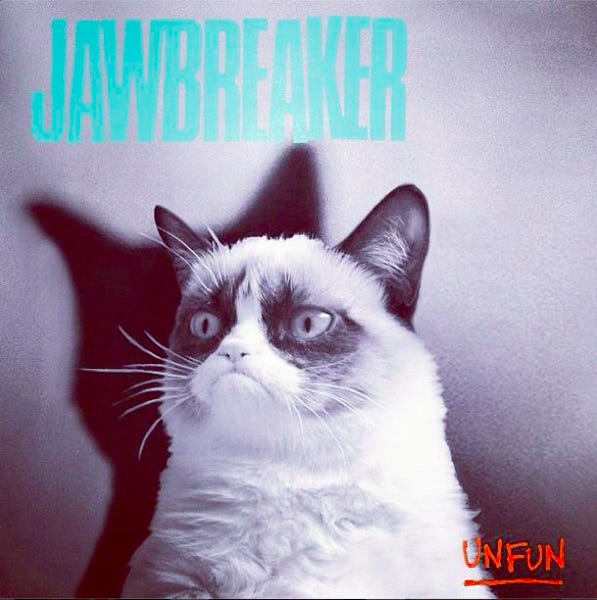
I got into Jawbreaker in an appropriate way. First time I heard them was through a friend who was in a Jawbreaker-esque shredded vocal pop-punk band. Then he was in a tough guy metallic hardcore band. Then he was in nothing because he died. Second time I heard Jawbreaker was through a girl who had a crush on my skinhead roommate and who lent me a mixtape someone else had made for her. Death, disappointments, borrowed taste and premature nostalgia for other people’s lives; if there was a Jawbreaker fan checklist, I was double fisting No.2 pencils. When Blake Schwarzenbach sang “Said all my chicks smoke these things/ And handed you a Chesterfield King,” I switched brands before my affectation had even become a proper habit.
Jawbreaker - Blake Schwarzenbach on vocals/guitar, bassist Chris Bauermeister, and drummer Adam Pfahler- formed at NYU in 1986, moved to LA, and eventually settled in San Francisco. They were part of a fertile and sonically diverse Bay Area scene that, consisting of bands ranging from the perfect pop of Cringer/J Church to the delightfully abrasive Blatz and Filth to the equally pop and abrasive Crimpshrine, played with and combined every possible permutation of “pop” and “punk, before the “pop-punk” genre became its regimented Ramones/Buzcocks final form in the mid-’90s. Though the band was a touch older than most Lookout! signees, they appeared on the Ben Weasel curated Punk U.S.A. comp. and had a longstanding working relationship with Lookout’s co-owner Christy Colcord (EDIT: I’ve been told that Colcord was not a co-owner of Lookout! I was going from the P4K oral history of 24 Hour Revenge. Apologies.). There was no schism between Jawbreaker and Bay Area punks (at least not before Jawbreaker signed to the majors). But, while very much a Bay Area Punk Band, with band members deeply involved with both the famed Gilman Street venue and punk fanzine/Old Testament Maximum RocknRoll, Jawbreaker always seemed to exist outside the Lookout! Records scene that defined that era. While rejecting the tough guy tropes inherent to even the more melodic East Coast hardcore bands, Jawbreaker, even from the outset, sounded like they could be tough guys. If not the straight up thuggery of NYHC, at least of the Social Distortion/Naked Raygun “seen some shit” school of desperate vocals and chugging guitars. More than any of their SF peers, Jawbreaker sounded like they could have come from anywhere in America that had punks in t-shirts and dirty sneakers; the New York that birthed Garden Variety, the Chicago that birthed Pegboy, the Chapel Hill that birthed so much muscular, non-hardcore indie rock.... Sound aside, from the outset, there was a tension between Jawbreaker and the, presumably still pretty mad about The Go-Go’s or whatever, more dogmatic elements of the California punk scene.
Starting with their first album 1990’s Unfun, Jawbreaker put forth a questioning of punk’s judgmental tendencies as one of their central lyrical concerns. While, up through 1992’s Bivouac and 1994’s 24 Hour Revenge Therapy, the band espoused a strict DIY (in the old “actually means something” sense) ethos while, at the same time, hedged their bets by hinting that some of the “kids” might, in fact, be fucking morons. In the early ‘90s, this put them roughly ten years after The Clash and fifteen-twenty years before Against Me!’s respective railing against their respective audience’s insistence on purity. If Jawbreaker’s “Boxcar,” with its eternally referenced, ironically phrased opening line, “you’re not punk and I’m telling everyone” resulted in at least two generations worth of VICE middle-management carreer-justification, that’s hardly San Francisco’s premier pop-punk/emotional hardcore crossover act’s fault. If Jawbreaker hadn’t told me it was OK to sellout, Green Day (or The Clash… or Against Me!... or Blood Brothers… or any other band with more than half a dozen songs about what judgmental, feral pricks the “kids” are…) would have. Once you come to terms with the fact that your choice of counterculture has worked, in concert with all “cool” culture, as unpaid shills for the tobacco industry for half a century, it doesn’t take an undue amount of soul searching to sign on the dotted line.
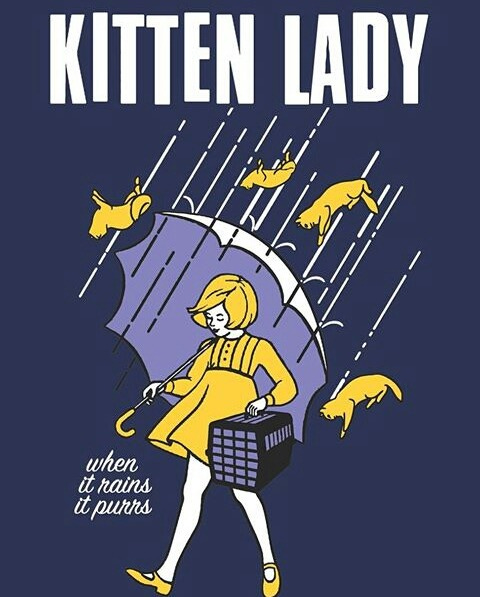
It’s the 25 year anniversary of Jawbreaker’s major label debut, Dear You. It’s a fun album, loathed by many punks at the time, still loathed by Pitchfork in 2004, and overrated now partially because every punk/indie album recorded prior to 2018 is. I’m thrilled to take this august occasion as impetus to slap around a bunch of well intentioned, uber self-reflective, truly decent people who never did anything but add value to my day-to-day life. After all, Jawbreaker’s other main concern, besides the integrity fetishizing crapulence of The Kids and the fallibility of the human heart, was a critique of Blake Schwarzenbach’s every base feeling, a critique that would make a Maoist struggle session leader proud. Therefore, seeing as I strive, in this life, to be loyal to the higher spirit of any given rocker’s work, I take in the band’s self loathing, grant them their desired agency, and, while thinking they’re wonderful and important to me, agree that they suck. I owe Jawbreaker that much.
Sure, if we operate under the assumption that Jawbreaker didn’t get back together specifically to fuck with Jawbreaker Reunion’s career, the band is reasonably innocent. We can’t let punk purists, often literal teenagers or adult hypocrites, have the final word on the career choices of any artists in general, let alone specifically a band as life affirmingly romantic and profoundly influential as Jawbreaker.
OR CAN WE.
Out of a combination of defensiveness, cachet envy, distrust of vinyl collecting as political stance, and having a fiancee whose family comes from a country that’s been occupied by America for two decades and therefore doesn’t find the genre/lifestyle’s Discharge-ian commodification of war imagery, where the original anti-war intention has devolved into a dissociated-from-actual-misery genre signifier, particularly cute… I don’t generally put a lot of premium on what is or is not “punk.” Conversely, as someone who appreciates a certain consistency of a life devoted to opposition, I do put a fair amount of value in punk puritanism. I hate rules while perversely admiring those who live by them, as long as it’s done on their own terms. It’s admittedly easy for me because, as a non punk dude, I’ve never been scolded by any MRR columnists in any meaningful way. So I can use the scolder’s righteous dictums against selling out as more a suggestion than command, while kind of idealizing the stalwart DIYers themselves; their clarifying heat and bracing certainty, their values that skate the fine line between integrity and busy-bodiness, all the wonderful pins and patches on their frayed, fitted jackets.
In 1993, the musician and producer Steve Albini wrote an essay about “indie” bands signing to major labels. It ran in the December issue of The Baffler (under the title “The Problem With Music”) and was reprinted in the June 1994 issue #133 of Maximum RocknRoll (under the umbrella of the issue’s thematic cover headline: “Some of Your Friends Are Already This Fucked” - with accompanying cover image of a punk with a gun in their mouth). The essay, while written in Albini’s jeremiad-ic style, is not, on its face, a moral denunciation of punk bands signing to majors. Listing the myriad ways that major labels will financially and artistically fuck over musicians, it’s framed as a pragmatic warning/told-you-so. But the essay’s caustic tone (along with Albini’s choice of publishers) makes clear that anyone who thinks they’ll be the exception to the major label meat grinder is a sucker at best. Considering Albini’s storied contempt for suckers, this is a moral judgement.
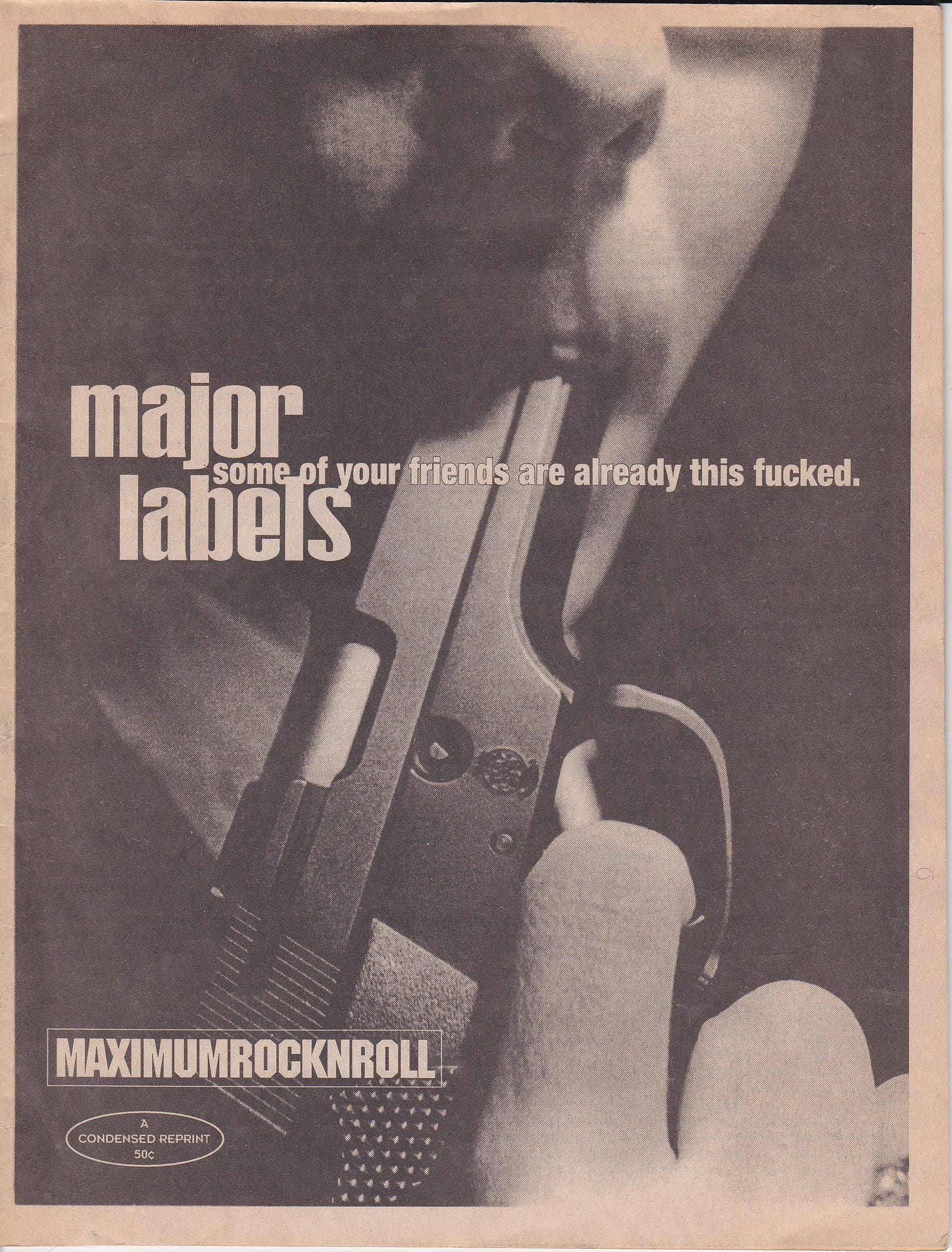
Pragmatic or moral, the astuteness of Albini’s warning was born out by Dear You’s short-term fate. While Jawbreaker didn’t invent the raspy, world weary punk voice (that all came from the blues obviously but for punk either came from Lemmy, NYHC, Poison Idea, or Tom Waits), they were the American band that (arguably arguably arguably) came to most codify the style as a signifier for, in the context of punk adjacent music, realllllly meaning it, emotionally speaking (with Leatherface doing the same, if far more indebted to Motorhead than Jawbreaker ever was, in the UK). So part of their identity was Blake’s chewing glass while reciting love poetry, that when throat surgery forced the singer to take it down a notch to mere Psychedelic Furs scabrous, longtime fans, fairly or not, were irate. The fact that Jawbreaker signed to DGC for a reported million bucks didn’t help. Catchy as they were, Jawbreaker didn’t write the kind of NOFX/Offspring/Blink-182 sing-song lullabies that could bring in a new audience to replace the fleeing purity punx. Dear You sold, a great by my standards but I guess not so great compared to Green Day, 40,000 copies. The band broke up in 1996. Short term, not too many people shed too many tears about it.
Unfortunately, every person who did shed copious tears over Dear You went on to form a band.
For a band that I’ve always expressed a great fondness for, that “unfortunately” needs some explaining (though I’m sure many readers know what I’m talking about immediately). Most people who feel ambivalent about Jawbreaker nowadays don’t, in fact, feel ambivalent about Jawbreaker. Some probably even have the band’s logo (four “F”s standing for "Frisch, Fromm, Fröhlich, Frei" -”Hardy, Pious, Cheerful, Free”) tattooed somewhere on their body. Almost all can still get busy doing dishes in the privacy of their homes while Unfun or 24 Hour Revenge Therapy plays in the background. The catalog isn’t the issue. Not much of the issue anyway. While the vast majority of the words to their songs were moving, insightful, and occasionally hilarious, Jawbreaker agnostics (and many fans), with age and wisdom and a shit-ton of retrospective embarrassment, share a discomfort with some of the creepy meanness of some Jawbreaker lyrics, especially (but not exclusively) the lyrics on Dear You. Setting aside “Fireman,” (“Dreamed I was a fireman/ I just smoked and watched you burn”), Jawbreaker, even when sweet, excelled at the “I told you you I was a jerk” solipsistic othering that makes all “good guy” nightmares tick. As I’ve said before, honesty is great but there's honesty that serves as an emotional preemptive strike. Schwarzenbach’s self-lacerations were clever (“literary” if one must) in their use of puns and willingness to admit internal ugliness. These revelations however; the unnatural way they’re expressed, could also create distance. Worse, they create characters. Worse still they create characters that people, under the guise of relating to them, could and would inhabit to the point of creating them in their own lives. And then other people have to date these characters.That being said, nobody who got down with Afghan Whigs or Bob Dylan necessarily thinks Jawbreaker lyrics are any more detrimental to the interpersonal moral compass than a lot of other stuff we listened to as young, sweaty golems of passive aggression.
If hardly anyone (least of all me) would deny that the music itself holds up remarkably well and we can live with both Jawbreaker’s subsumption into the cliche of mid-’90s underground-to-overground floppery and the band’s contribution to the Cringe Inducing Ex canon, then what exactly is the problem? The current fandom of Smart Punk nostalgics is an easy enough target to people younger than me. As one twenty year old online pal wrote to me, “Don’t get me wrong I love them, but the tattooed 40 year old punk who owns a print shop demographic has made it so annoying to like them.” But I’m 45, some of my best friends own print shops, and when I last saw Amyl and The Sniffers, I knew every balding, terribly tattooed lurker in attendance. So, while I may take the occasional cheap shot at slightly younger Menzinger fans, I don’t have much standing to turn on my peers who brag about their complete Punk Planet collections and use their microbrewery profits to keep their babies in vintage Lucero onesies.
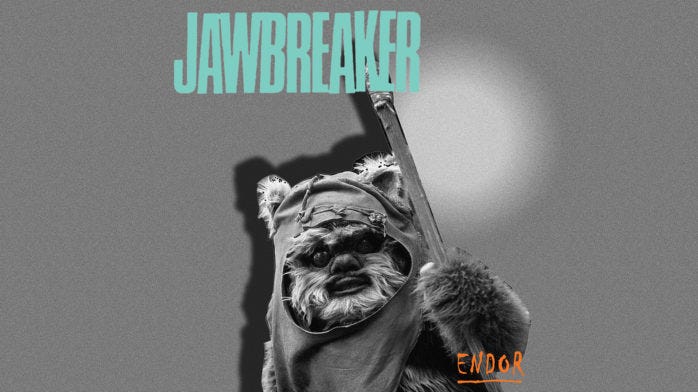
As is the case with so many of these bands, it’s less the band than the band’s influence that bums a discerning motherfucker out. If there were more than a half dozen bands in existence that sounded remotely like Crimpshrine or, like, Spitboy, maybe it would be them in the newsletter woodshed. It’s just Jawbreaker’s bad luck that they found so many new and novel ways to be a negative influence.
How do we enumerate all the garbage that came in Jawbreaker’s wake? Who has that many fingers? College rock as punk, region rock in general, “smart” lyrics reifying the tired tropes of “girlfriend as enemy,” beards as personality shortcuts, Drinky Crow tattoos on grad students, “Boxcar”’s astute defense of poseurs as Get-Out-Of-Jail-Free card for any and all compromise, anodyne distortion riffs under assholdeom masked by “self awareness”: Saves The Day, Newfound Glory, Jimmy Eat World, The Promise Ring. THE FUCKING PROMISE RING. Your ex-girlfriend or ex-boyfriend and all the weird shit they pulled, probably. All Jawbreaker’s fault. Not Jawbreaker’s fault alone of course, but of all the bands sharing responsibility for the cavalcade of shit and mediocrity that made up the next ten years of pop-punk and emo, Jawbreaker are the only band I like*, and therefore care enough about enough to push around. (I guess I like Pegboy more, but I won’t be hurting Pegboy’s feelings by pointing out that their influence upon the larger culture has been… reasonable.) Point being; if fate and Jawbreaker’s own universal relatability hadn’t set them up as an American bagpipe-less Pogues (EDIT: The Pogues did not, in fact, ever use bagpipes. Apologies.) , a mandatory CD in every punk jukebox in every punk dive bar from Brooklyn to Oakland, maybe all your exes would have turned to the bible or power violence to fill their stupid voids. By now, rent would be cancelled, alcohol would be non-addictive, and we would all be flying over open fields of swaying wheat with jetpacks powered by non-imitation Pudding Pops attached to our strong and blackhead-free backs**.
While the complete collapse of the music industry has rendered a lot of punk purist concerns about selling out moot, I think we can finally have the humility to admit that even the most irritating naysayers were, to a degree, right. (At least specifically about signing to major labels, if not about charging more than $5 for shows or licensing your music or any of that other shit that pays a working musician’s rent.) Outside the Green Day musical and Peter Wentz’s relationship with Ashlee Simpson, nothing good came out of a single punk band signing to a major. It just reduced the Overton Window of what we could yell at rockstar wannabes about, before being accused of niche-concern-fixated elitism. Concern over the market’s indifference/animosity towards art became accepted as the sole purview of richies and trust funders with no appreciation of “the real world.” As if the real world was anything to write home about in the first place. And now we all live within a streaming/theft (both by corporation and consumer) economy, this deeply weird “there is no such thing as selling out” prevalent dogma that puts all music consumption on the same plane of coverage, but with one side (the existing major labels) with millions to spend on taking up all the coverage air in a shrunken and shrinking media arena.
All that being said, and at the risk of indulging in an “on the other hand…” philosophical tic, I don’t need any Bay Area spikey jacket ‘n’ back patch hobbyists to tell me what kind of pizza to like. So is Dear You, divorced from all the smooth voiced fear-of-girl that it helped spawn, any good? Ohhhhhhhhh… let’s just say that it’s “pretty solid.” It’s got some brilliant choruses over some new, almost Corona groove metal, moves. I can’t say I ever wanted Jawbreaker’s idiosyncratic crunch traded in for Nirvana vibes minus the Husker Du worship. But I part ways with the punks and like Blake’s voice on the record, and the rhythm section’s habit of swooping into mini breakdowns on almost every song still gets my motor purring. And I can’t ever say enough about how the title of the best song on the album, “Bad Scene, Everyone’s Fault,” (a brilliant analysis of house party melodramas that serves as an inversion of Subhumans’ equally brilliant “‘Til the Pigs Come Round,” with all the punks in the latter song replaced by wimps) has served as a funny enough point of reference, an inside joke shared amongst forty thousand, over the years. Like I said, it’s a fun album. But, even on the repeated listens it took to write this newsletter, I still don’t love it the way I love Unfun, Bivouac, their R.E.M. cover, or about a third of 24 Hour Revenge. Or even that one goddamn perfect song on the first Jets To Brazil album. Dear You is good, I won’t let contrariness dictate otherwise, but, if you know what I’m saying, it just… sounds too much like other albums that sound like it.
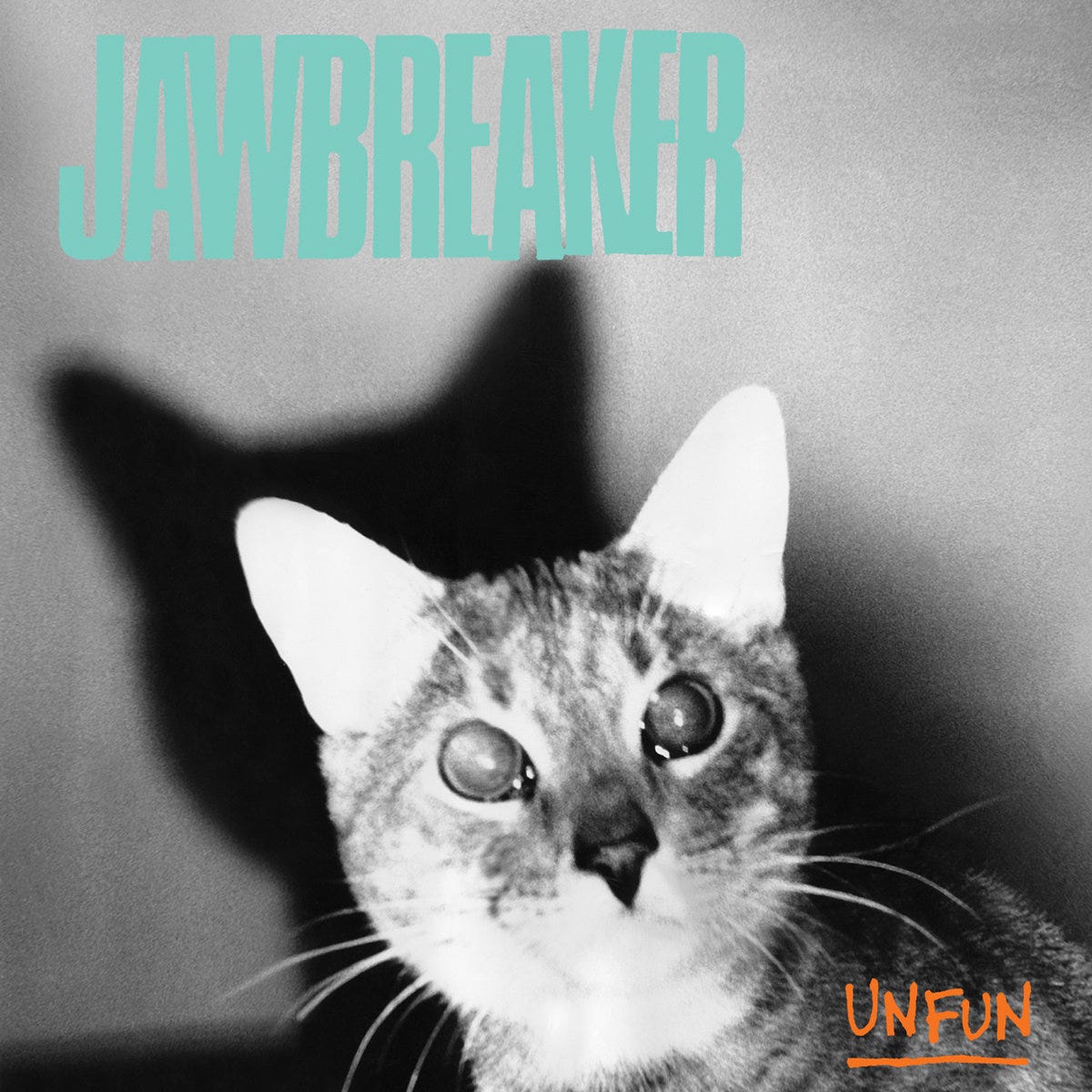
Outside my abhorrence for their cultural influence or large swaths of their fandom’s preoccupation with “community” and “being nice,” my personal associations with Jawbreaker are still largely positive. My old band was once hired to play a friend’s birthday where she required every band to play a Jawbreaker cover. We were assigned “Kiss The Bottle” and, singing “I kissed the bottle/ when I shoulda been kissing you,” I got to feel, for a few minutes, what it was like to be one of those hard loving basement punks, crushed out on wordplay and the world. Even after a veritable lifetime of listening to drunken sing-alongs of it in dive bars I was working in, It’s still one of my favorite songs. But, and maybe it’s an indication of a soul lacking in high romance, when I’m an asshole to the girl I love, I’m never tempted to write an anthemic pop-punk song about my litany of fuck-ups, with myself the tortured and alienated antihero. I just apologize and make her dinner.
Thanks for reading!
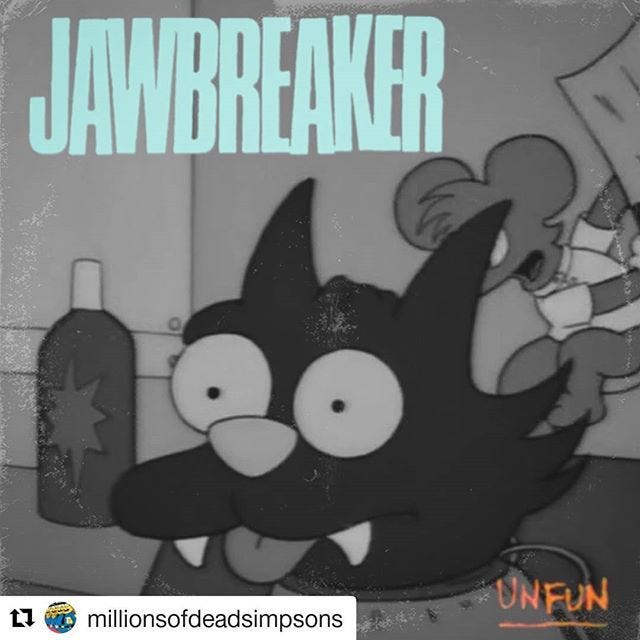
*Obviously albums like Weezer’s Pinkerton own the lion’s share of blame. But my entire generation of critics have managed to commit a Berenstein/Berenstain type historical memory shift, where they all knew that the album sucked all along, and I must respect the revisionist chutzpah of my class.
**I realize I made an almost identical point of theoretical comparison in other essays. I say “cake is delicious” a lot too. Thanks for reading.



